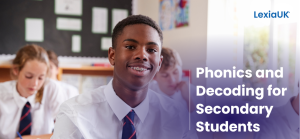Each year, around one quarter of students do not meet the expected standard in reading by the time they reach secondary school (DfE, 2022). Increasingly, the need for specific intervention in foundational reading skills, such as phonics, has become vital in ensuring that all pupils can achieve academic success across the whole curriculum.
Often, it can be a challenge to find age-appropriate resources and staff that have the knowledge and skills to teach these early reading skills.

Why is Phonics & Decoding so Important?
Learning to read is not a simple task. It is made up of multiple processes and skills that work together to achieve full text understanding.
This is commonly explained by the Simple View of Reading (Gough and Tunmer, 1986) which explains that full reading comprehension is made up of both language comprehension and decoding skills. Deficiencies in any of these core skills can then lead to differing issues in reading accurately and with understanding. Watch the video below to learn more about the Simple View of Reading and how reading can be broken down into these core competencies.
Which Foundational Reading Skills Should Students be Practising?
The basics of reading can be broken down into a few key skills. For non-proficient readers, explicit practice of these core skills is vital, which is why Lexia PowerUp Literacy features each of these skills in the early levels of the Word Study strand:
- Blending: The ability to combine sounds together to read words. This can be practiced by providing students with separate sounds and asking them to blend them together to create words.
- Segmenting: Conversely to blending, students also need to be able to split words into their individual sounds, this is known as segmenting. Practice by listening to words and splitting them up into their individual sounds. This skill forms the basis of spelling.
- Confusable sounds: Often, students come to secondary with some misconceptions and may confuse similar sounding graphemes, causing inaccuracy in their spelling. Practicing distinguishing between these sounds helps to address these misconceptions, empowering pupils to be more precise with their spelling.
- Letter-Sound Correspondence: Once student have a grasp of verbal sounds, introducing the various graphical representations of sounds enables students to apply their knowledge to word-reading. This can then be built upon by breaking up and reading multi-syllabic words.
- Fluency: This skill acts as the thread that weaves all foundational reading skills together, by practicing decoding until it is automatic, fluency is achieved along with the ability to better comprehend text. Revisiting these skills regularly to support automaticity is vital to confident and fluent reading.
The Structured Literacy Approach
PowerUp utilises a Structured Literacy Approach to teach these foundational literacy skills which means it is built on 4 main principles:
- Systematic and Cumulative – Concepts are sequenced in a logical order and builds gradually.
- Explicit – Concepts are taught directly and clearly and each skill is clearly modelled.
- Multisensory – Multiple learning modes are utilised to ensure that all types of learners are catered for.
- Diagnostic – Initial assessment means that content is pitch exactly at the student’s level.
Download the ‘Supporting Phonics’ at Secondary’ Guide
Click the link below to download our Secondary phonics guide and gain further insight into how Lexia PowerUp Literacy tackles these essential skills in an engaging and age-appropriate manner.
